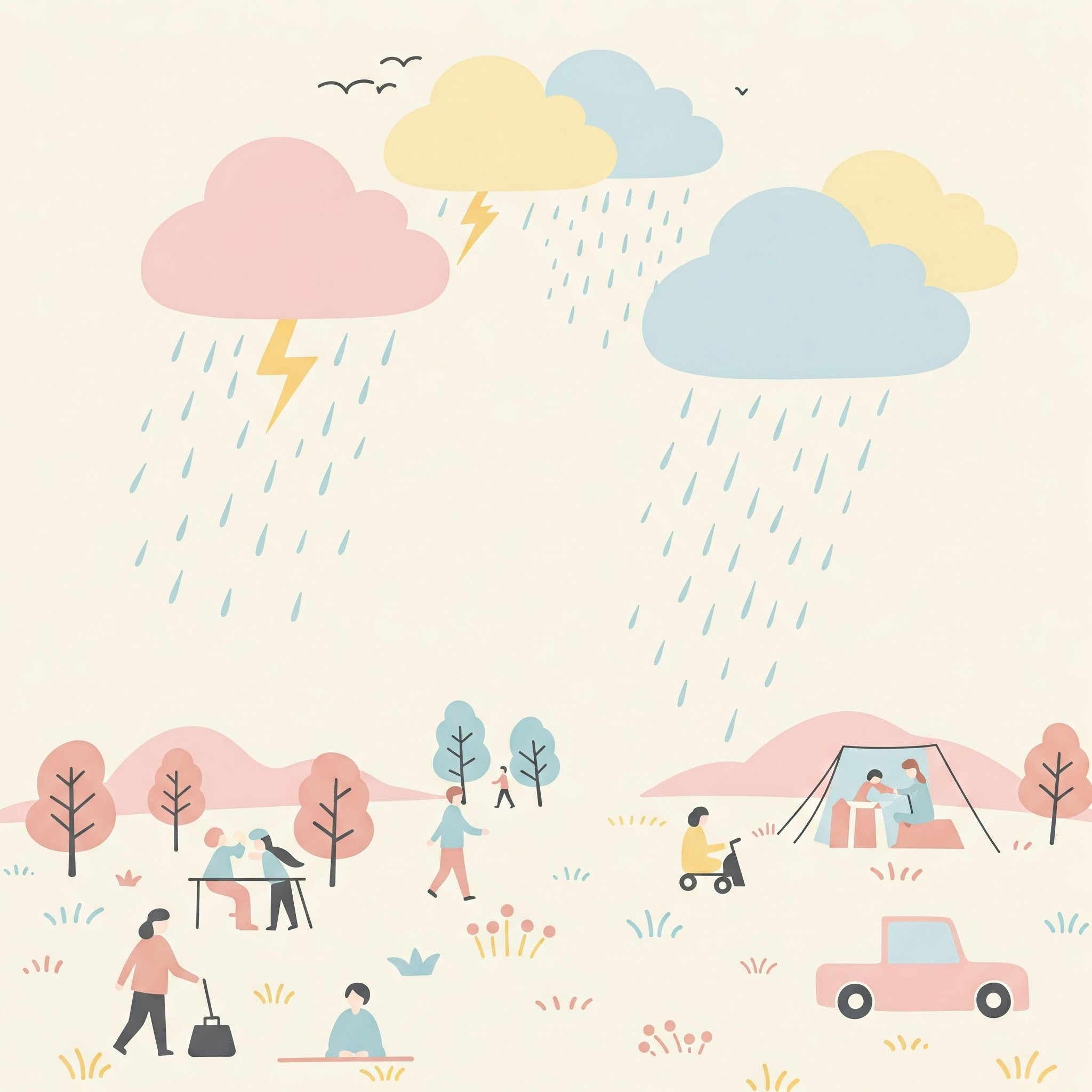Weather and Daily Activities in Chinese
Talking about the weather and your daily activities is a great way to make simple conversation in Chinese! In this lesson, you'll learn basic weather terms and common words for daily routines.
Basic Weather Words
Let's learn these common terms to describe weather conditions:
Time of Day Words
These words will help you talk about different parts of the day:
Daily Activities
These common verbs describe things you do every day:
Time Words
These useful time words help you talk about when things happen:
Understanding Weather Words
Let's learn about each of these important weather terms:
Weather
天气weather means "weather" - the most basic word you need to talk about climate conditions. You can ask 天气怎么样? (How's the weather?) as a common conversation starter.
Cold
冷cold means "cold" - use this to describe cold weather. In winter, you might say 今天很冷 (Today is very cold).
Hot
热hot means "hot" - perfect for describing hot weather. During summer, people often say 太热了 (It's too hot).
Raining
下雨rain, to rain means "to rain" or "it's raining" - a very common weather condition in many parts of China, especially during spring and summer.
Snowing
下雪to snow means "to snow" or "it's snowing" - something you might experience in northern China during winter months.
Sunny Day
晴天sunny day, clear sky means "sunny day" - everyone loves a clear, sunny day! This is a positive way to describe nice weather.
Understanding Time of Day
Now let's learn about these important time expressions:
Morning
早上morning means "morning" - the time from when you wake up until around noon. People often greet each other with 早上好good morning (Good morning).
Noon
中午noon means "noon" or "midday" - usually referring to the period around 12pm, often associated with lunch time in China.
Evening
晚上evening, night means "evening" or "night" - the time after sunset. People use the greeting 晚上好good evening (Good evening) during this time.
Common Daily Activities
These verbs describe actions that are part of everyone's daily routine:
Getting Up
起床get up means "to get up" or "to wake up" - the way to describe starting your day. For example: 我早上六点起床 (I get up at 6 in the morning).
Eating
吃饭to eat (a meal) means "to eat" or "to have a meal" - a general term that can refer to any meal. For example: 我们中午十二点吃饭 (We eat at 12 noon).
Sleeping
睡觉sleep, go to bed means "to sleep" or "to go to bed" - how you talk about ending your day. For example: 我晚上十点睡觉 (I go to sleep at 10 at night).
Understanding Time Words
These three simple time words are essential for daily conversations:
Today
今天today means "today" - the current day. This is often used at the beginning of sentences about present conditions.
Tomorrow
明天tomorrow means "tomorrow" - the day after today. Use this to talk about future plans.
Yesterday
昨天yesterday means "yesterday" - the day before today. Use this to talk about recent past events.
Mini Weather and Daily Routine Dialogues
Try practicing these simple conversations:
Dialogue 1: Talking About Today's Weather
Dialogue 2: Making Plans Based on Weather
Dialogue 3: Daily Routine
More Weather Expressions
Here are a few more useful weather phrases:
- 下雪了 - "It's snowing" - use this to announce that snow has started
- 下雨了 - "It's raining" - use this to announce that rain has started
- 刮风to be windy - "It's windy" - when there's a strong wind
- 阴天 - "Cloudy day" - when the sky is covered with clouds
- 很热 - "Very hot" - during hot summer days
- 很冷 - "Very cold" - during cold winter days
Daily Routine Vocabulary
Here are some more useful daily activities:
- 洗澡to take a bath/shower - "To take a shower/bath"
- 刷牙to brush teeth - "To brush teeth"
- 上班be on duty - "To go to work"
- 下班to get off work - "To get off work"
- 看电视to watch TV - "To watch TV"
- 学习study, learn - "To study"
Weather and Time Sentence Patterns
Here are some typical patterns for talking about weather and daily routines:
- 今天怎么样 - How's the weather today?
- 今天很热 - Today is very hot.
- 今天是晴天/今天是晴天阴天 - Today is sunny/cloudy.
- 我早上时间活动 - I do [activity] at [time] in the morning.
Cultural Notes about Weather and Daily Life in China
Understanding these cultural aspects will give you insight into daily life in China:
- Weather greetings are very common conversation starters in China
- Early rising is common in Chinese culture, with many people starting their day around 6am
- Midday rest or napping after lunch is common in many parts of China
- Dinner time tends to be earlier in China than in Western countries, often around 6-7pm
- Weather sensitivity in Chinese medicine means people pay close attention to weather changes
Practice Tips
- Check the weather forecast in Chinese each morning
- Describe your daily routine using the time and activity words
- Practice the question 天气怎么样? with friends learning Chinese
- Label items related to weather (umbrella, sunglasses, etc.) with Chinese vocabulary
With these weather and daily routine words, you'll be able to participate in everyday small talk in Chinese! These topics are perfect for simple conversations and are a great way to practice your new language skills in real situations.
